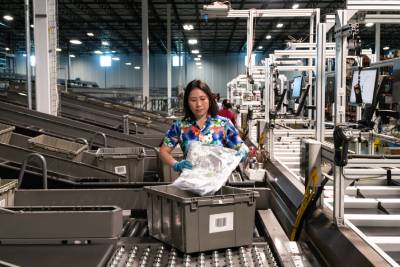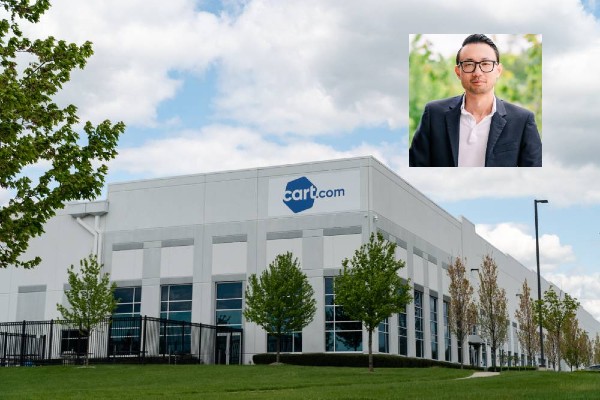Spotlight Startup: Cart.com is Reimagining Logistics
Co-Founder Remington Tonar discusses starting a company during the pandemic, building trust with customers, and reaching the lofty unicorn status.
Welcome to Startup Spotlight, where we shine a light on innovative companies transforming the supply chain industry. In this edition, we welcome Remington Tonar, Co-Founder and Chief Growth Officer at Cart.com. Join us as Remington discusses starting a company during the pandemic, building trust with customers, and reaching the lofty unicorn status.
Company Snapshot
Name: Cart.com
Headquarters: Houston
Year founded: 2020
Number of Employees: 1,500
Can you provide some basic information on your company?
Cart.com is a unified commerce and logistics company that leverages software, AI, and our network of fulfillment centers to solve the inventory, supply chain, and fulfillment challenges facing various industries.
For merchants, Cart.com offers commerce solutions that help efficiently manage, list, advertise, sell, and distribute products across channels. These solutions include software and software-enabled services, which include channel, order & inventory management software, marketplace services, and software-enabled fulfillment services.

We support more than 6,000 D2C, B2C, and B2B companies and more than 75 million orders per year. Our customers include retailers like TOMS, PacSun, Draper James, and Janie and Jack as well as a range of public sector agencies and large enterprises requiring software-enabled inventory and order management, as well as logistics and fulfillment services.
What inspired you to start this business, and what gap in the market are you trying to fill?
As e-commerce continued to grow in popularity, we saw a challenge that was increasingly difficult for retailers to solve: the operating environment for sellers was becoming more and more fragmented. It was becoming harder for brands to meet customers’ demands across a growing number of digital and physical touchpoints.
This problem was particularly salient for our Founder and CEO, Omair Tariq, who was an executive at D2C retailer Blinds.com, which was acquired by The Home Depot where he went on to be a key member of the HomeDepot.com leadership team. We set out to solve this commerce complexity by unifying the capabilities required to sell across channels seamlessly at scale. Cart.com’s initial vision was to build a unified cart that enables customers to buy across channels seamlessly and allows sellers to cart products wherever they need to go efficiently. Following several strategic acquisitions, the company now offers a comprehensive set of pre and post-purchase software and services that allow merchants to unify, manage, and automate marketing, sales, and distribution channels to meet their customers wherever they are while scaling more profitably.
Can you share your experience in obtaining funding for your venture?
When we founded the company in late 2020, e-commerce was experiencing an incredible acceleration due to the pandemic. By the end of 2021, e-commerce sales were still pacing at 50% greater than the same period in 2019. So we saw incredible excitement from investors in our vision and the larger opportunity.
In the following years, the growth rate of e-commerce largely normalized and capital became more expensive. With that, we saw most investors shift their north star metric to profitability over growth. What makes Cart.com unique in this environment is that we’ve been focused on delivering both since our inception.
In mid-2023, we announced a successful Series C fundraiser and reached unicorn status. By the end of the year, we not only grew revenue by 50%, but we also achieved sustainable profitability. Still, the cautious capital environment has generally meant it is harder and takes longer to fundraise, even as a financially sound and growing company.
Can you share any challenges that you had to overcome in building your business?
Like any new startup entering a fairly established industry, we anticipated building trust with potential customers – particularly established, mature brands and large enterprises – would be a challenge. We came to market with the big idea of connecting the entire commerce value chain, enabling retailers and enterprises to better connect their data and operations, consolidate vendors, and save money. The surprise was how quickly we were able to establish trust with some of the largest global brands and enterprises and scale our growth.
“We came to market with the big idea of connecting the entire commerce value chain, enabling retailers and enterprises to better connect their data and operations, consolidate vendors, and save money. The surprise was how quickly we were able to establish trust with some of the largest global brands and enterprises and scale our growth.”
Our customers tell us this is a combination of both the strength of our innovation and technology as well as the strength of our leadership team, which includes a wide range of industry veterans and top operators with decades of experience in e-commerce and logistics. By bringing in that talent, we gained a global perspective on the key areas where technology could solve supply chain challenges, enabling us to build out an offering that delivers the performance and results our customers require to compete in a fiercely competitive and complex e-commerce landscape. As we’ve built out our own track record of reliability and innovation, we’ve been able to compete for and win bigger and bigger deals and are now proud to work with some of the most beloved retailers and most trusted enterprises in the industry.
What's your approach to building a team and company culture?
We founded Cart.com during the pandemic, which meant that the company was remote-first from the beginning. So our first challenge was simply to build a sense of purpose and culture across an all-remote workforce. As we moved into 2021 and 2022, we acquired several companies that added hundreds of employees based all around the world. These companies all had their pre-existing histories and cultures that we then had to integrate and unite into one larger company.
At the same time, Cart.com was growing organically, which meant that we were hiring new employees across teams at an incredibly rapid pace. We believe all of these elements – intentional or not – helped us build the incredibly diverse workforce we have today. As a company working to unify the disparate and fragmented pieces of the commerce value chain for customers, having this diversity across backgrounds, skill sets, industries, functions, and locations, helps us bring in different perspectives that ultimately help us serve our customers better.

Cart.com is the only major player unifying commerce across sales and distribution channels as well as across digital and physical capabilities. On the front end, our software helps merchants automate and manage listings across 2,000+ social and shopping channels as well as across all major marketplaces. We also offer white-glove services like growth marketing, marketplace optimization, and customer support for brands. On the back end, we operate 14 tech-enabled omnichannel fulfillment centers, helping brands pick, pack, ship, and store products for any channel. Our goal is to make it easier for brands to sell and fulfill products wherever their customers are while helping them drive more efficient growth.
What does the future hold for Cart.com?
We're continuing to invest in software and capabilities that provide our customers with a robust, interconnected infrastructure that optimizes and orchestrates the digital and physical aspects of selling and fulfilling in a scalable and profitable way.
“Our goal is to make it easier for brands to sell and fulfill products wherever their customers are while helping them drive more efficient growth.”
Last month, we announced the expanded availability of our proprietary AI-powered Order Management System, Constellation OMS, to customers outside our fulfillment network. Constellation OMS was built to help retailers unify order and inventory management, solve supply chain and fulfillment challenges, improve cost efficiency and drive growth.
Inventory and channel orchestration challenges have cost enterprises billions and slowed growth rates in recent years. We believe a unified order management system is key to winning in the omnichannel world and AI is the most powerful tool for navigating the current environment successfully - as long as it’s connected across every touchpoint in a retailer's commerce value chain.
As we layer in more and more of these AI-backed capabilities, including Inventory and Demand Forecasting, we’ll be able to take much of the guesswork out of product marketing and inventory management. We’ve already seen that connecting marketing and order data can improve traditional forecasting by up to 55%. Our model takes a look at online and offline campaign metrics, social media trends, and ad spend efficiency to calculate the direct impact of marketing efforts on demand spikes and customer purchasing patterns down to the SKU level. We then combine that with historical order data to forecast future demand, which can better predict where you might have excess inventory or a stock out issue. Overall, this helps retailers increase advertising efficiency while also helping 3PLs have better insights for labor demand planning, which drives cost savings on both the pre-purchase and post-purchase sides of the business.

What trends or changes do you foresee impacting your industry in the coming years?
There are two key trends – both of which point to a more unified commerce experience for merchants and customers – that we believe will have major impacts on the industry in the coming years. In the short term, consolidation is a big focus. We’ve already seen the beginning of some M&A activity, but we are also hearing from companies looking to streamline the number of vendors they work with to drive cost savings and overall efficiency.
During the pandemic, when capital was cheaper and growth was easier, you saw many brands follow a single-channel strategy. Post-pandemic, however, any brand (or vendor) that was overly reliant on any one channel has likely struggled to deliver growth and control their margins given competitive dynamics, pricing, advertising costs, and constantly evolving consumer shopping habits. Brands that will win in this environment understand that they have to diversify their channel mix to improve sales and margin, streamline the number of vendors they have supporting each channel to reduce costs and unify their data and operations across channels to achieve a complete picture of their business.
In the long term, the application of artificial intelligence across the commerce value chain will bring some exciting capabilities that enable merchants to work more efficiently and more accurately predict demand and in turn reduce costs. Among the things we’re already working on at Cart.com: leveraging generative AI and LLMs to optimize and automate merchandising across thousands of direct and marketplace channels, applying machine learning to automate and synchronize repricing in real-time and using AI-powered demand forecasting that ingests data like marketing and sales history, seasonality, current ecommerce performance and projected marketing campaign activity to deliver a more accurate picture of demand down to the SKU level.
By focusing on unifying data and operations across these disparate channels and systems, brands ultimately benefit from better intelligence and more control – all while running a more efficient operation.
Article Topics
Cart.com News & Resources
Spotlight Startup: Cart.com is Reimagining Logistics Cart.com Unveils New AI-Powered PlatformLatest in Warehouse|DC
Dollar Tree’s Oklahoma Distribution Center Decimated by Tornado European Parliament Passes Law on Supply Chain Accountability Transforming Warehousing with AI: Five Key Reasons to Adopt Now Talking Supply Chain: Understanding the FTC’s ban on noncompetes North Carolina Welcomes Amazon’s Newest Mega-Warehouse SAP Unveils New AI-Driven Supply Chain Innovations U.S. Manufacturing is Growing but Employment Not Keeping Pace More Warehouse|DC










